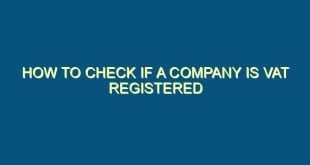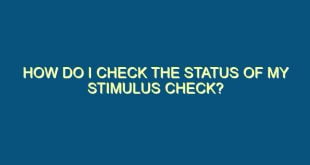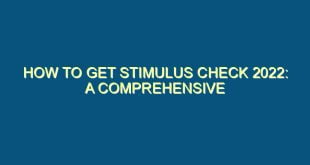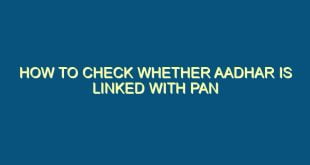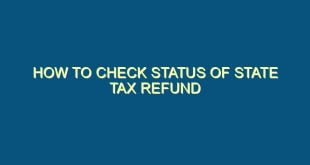Introduction
The economic impact caused by the COVID-19 pandemic has left many individuals wondering how they can get their stimulus checks. In this comprehensive guide, we will provide you with all the necessary information and steps to help you receive your stimulus check.
1. Understanding the Stimulus Check
The stimulus check, also known as the Economic Impact Payment, is a financial relief provided by the government to eligible individuals to help mitigate the economic effects of the pandemic. It is a one-time payment that aims to provide financial support to those in need.
1.1 Who is Eligible for a Stimulus Check?
To be eligible for a stimulus check, you must meet certain criteria set by the government. These include:
- Being a U.S. citizen or a resident alien.
- Having a valid Social Security number.
- Not being claimed as a dependent on someone else’s tax return.
- Meeting the income requirements.
If you meet these criteria, you are likely eligible to receive a stimulus check.
1.2 How Much Money Will I Receive?
The amount of money you will receive as a stimulus check depends on various factors, such as your filing status and adjusted gross income (AGI). The government determines the payment based on the information provided in your most recent tax return.
For individuals, the maximum amount is $1,200, while married couples who file jointly can receive up to $2,400. Additionally, eligible individuals with qualifying children can receive an additional $500 per child.
2. Steps to Receive Your Stimulus Check
Now that you understand the basics, let’s walk through the steps to ensure you receive your stimulus check:
2.1 Check Your Eligibility
Before proceeding, it’s important to confirm that you meet all the eligibility criteria mentioned earlier. Visit the official government website or consult with a tax professional to determine your eligibility.
2.2 File Your Taxes
If you haven’t filed your taxes for the previous year, it’s essential to do so as soon as possible. Filing your taxes ensures that the government has your most recent information, which is crucial for determining your eligibility and calculating the stimulus payment.
2.3 Ensure Your Direct Deposit Information is Up to Date
If you have previously provided your bank account details for tax refunds or other purposes, ensure that the information is still accurate and up to date. The government will use this information to directly deposit your stimulus check into your account.
2.4 Non-Filers: Submit the Necessary Information
If you are not required to file taxes, you can still receive a stimulus check. Visit the official government website and fill out the necessary form to provide your information. This will ensure that you receive your payment.
2.5 Track Your Payment
After completing the previous steps, you can use the “Get My Payment” tool on the official government website to track the status of your payment. This tool will provide you with valuable information about the expected date of payment, method of payment, and any issues that may need to be addressed.
3. Common Questions and Concerns
3.1 What if I Haven’t Received My Stimulus Check Yet?
If you haven’t received your stimulus check yet, there are a few possible reasons:
- Your payment may still be in process. Use the “Get My Payment” tool to track its status.
- You may not be eligible for a stimulus check based on the criteria set by the government.
- There may be an issue with your information or tax return. Double-check the accuracy of your details and consult with a tax professional if needed.
3.2 Can I Update my Direct Deposit Information?
Yes, if you have not yet received your payment and wish to update your direct deposit information, you can use the “Get My Payment” tool to provide your updated details. This will ensure that future payments are directly deposited into your preferred account.
3.3 What Should I Do if I Didn’t Receive the Correct Amount?
If you believe that you did not receive the correct amount of stimulus payment, double-check the information provided in your tax return. Ensure that you meet all the criteria and consult with a tax professional to rectify any discrepancies.
3.4 Will I Need to Pay Taxes on the Stimulus Check?
No, the stimulus check is considered a tax credit and is not taxable.
Conclusion
Getting your stimulus check is crucial during these challenging times. By following the steps outlined in this guide and ensuring your eligibility, filing your taxes, and providing accurate information, you can receive the financial support provided by the government.
FAQ
Q1: How long does it take to receive a stimulus check?
A1: The timing of stimulus check payments can vary. However, most eligible individuals receive their payment within a few weeks of the government’s announcement.
Q2: Can I receive a stimulus check if I am unemployed?
A2: Yes, being unemployed does not disqualify you from receiving a stimulus check. As long as you meet the eligibility criteria mentioned earlier, you should be eligible to receive the payment.
Q3: What if I don’t have a bank account for direct deposit?
A3: If you don’t have a bank account, the government will send you a physical check to the mailing address provided in your tax return.
Q4: Can non-U.S. citizens receive a stimulus check?
A4: Non-U.S. citizens who are resident aliens with valid Social Security numbers are eligible to receive a stimulus check.
Q5: Will receiving a stimulus check affect my eligibility for other government assistance programs?
A5: No, receiving a stimulus check will not affect your eligibility for other government assistance programs. The stimulus check is considered a tax credit and does not impact your eligibility for other benefits.
 muhitelyemen.net Everything you need to know about how to do something
muhitelyemen.net Everything you need to know about how to do something
